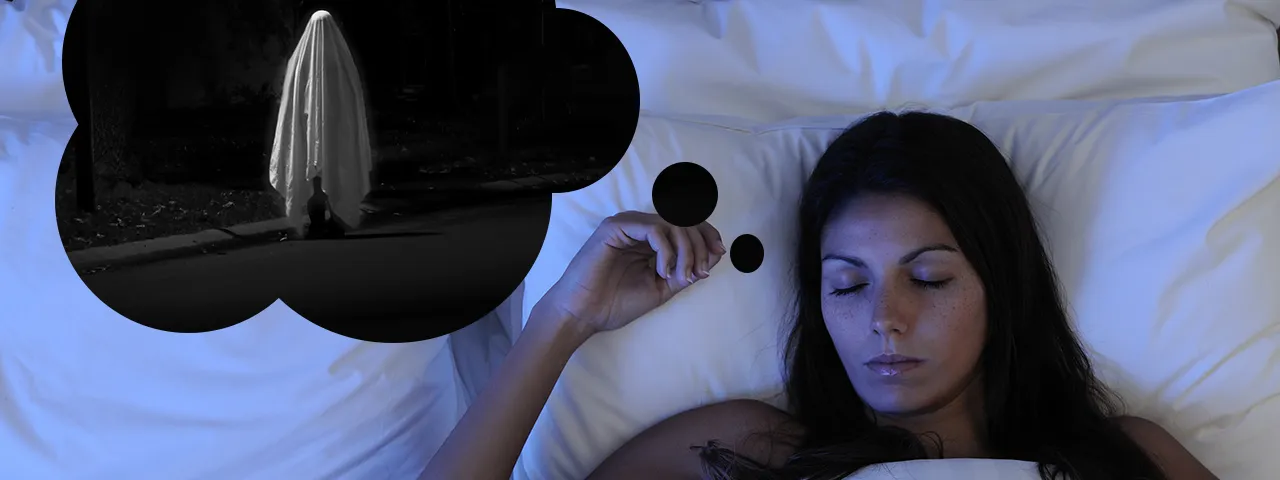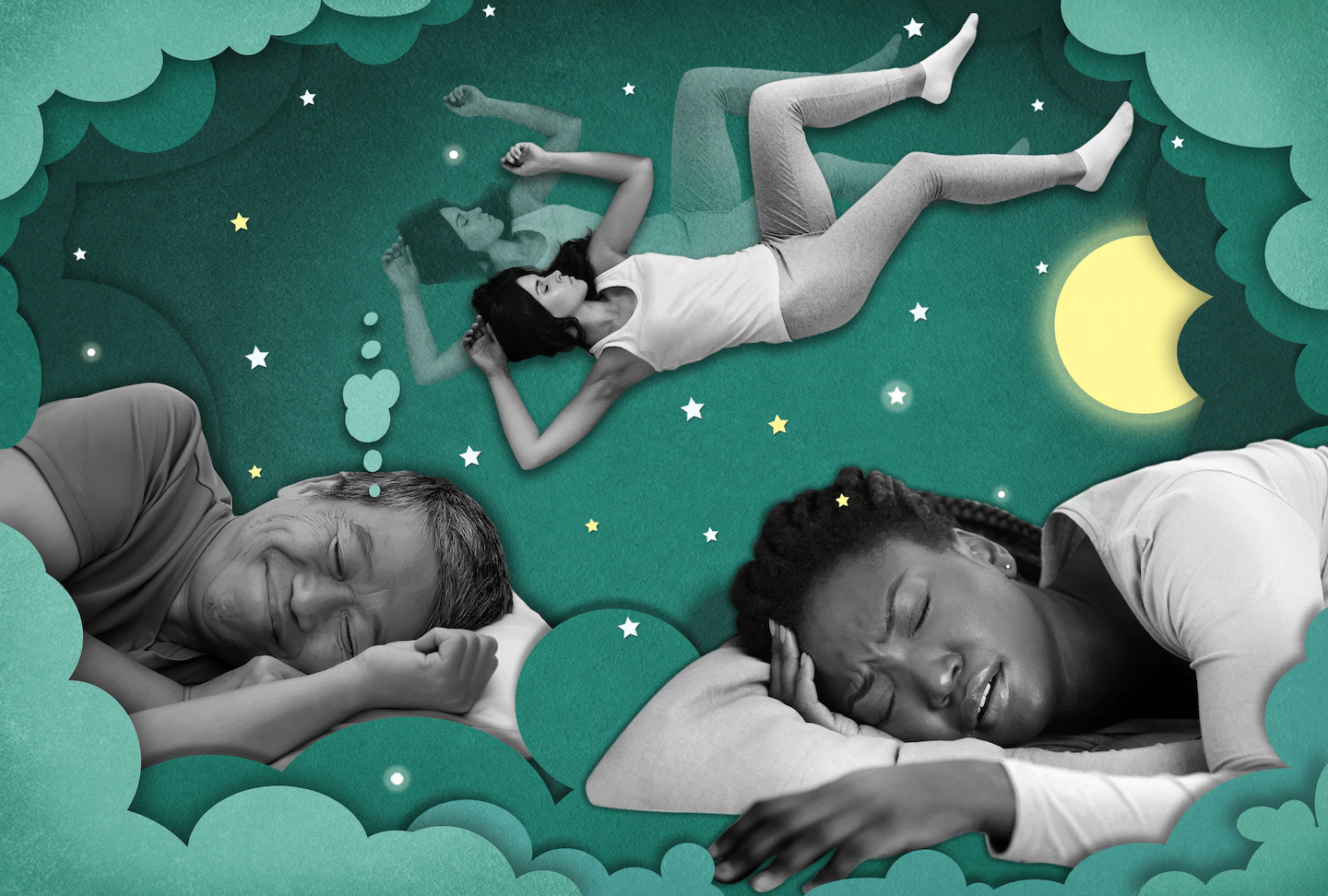Dreaming takes us to other realms. It’s where our brains process our day, our deepest emotions, our fears, and what makes us the most excited. Whether you’re hitting the pillow and can never remember your dreams, or are one of those people that actively practice lucid dreaming, you’re one of the billions of people on this planet who enter Dreamland on a nightly basis (or, you’d hope a nightly basis). But dreaming isn’t necessarily what you think it is… There’s a lot more to it than meets the eyelids.
Just because you dream a certain way doesn’t mean the next person does. Some people sleepwalk, others experience sleep paralysis, and others dream in black and white. We’ve discovered some unreal facts about dreaming that’ll make you rethink every night of your life. Next time your head hits that pillow, take a moment to appreciate your brain and everything it’s about to process.

Sleepwalking
Whether it’s in the movies or a book, we’ve all heard of sleepwalking. Despite its popularity, it’s quite rare to sleepwalk. It’s actually considered a sleep disorder. Because people sleepwalking acts out their dreams, which are representations of what happened in real life, sleepwalking can be dangerous and even deadly. If you dream about jumping through a window, then the sleepwalker will attempt to do something similar. When the system keeping you asleep fails, which occurs right before REM sleep, people will sleepwalk. Also, you should wake up a sleepwalker. It’s not dangerous, as we’re led to believe (The Minds Journal)

Not Every Dream Is Colorful
Up to 80% of your dreams are in color. But what about the other 20%? There are people out there that often dream in black and white. While this noir-style dreaming might seem cool, it’s a sign of anxiety, sadness, and depression. Because color signals happiness, vibrancy, and light, dreaming in black and white is a sign of just the opposite. Our dreams reflect our personalities and what’s happening in our lives. So if your dreams seem dull, dark, and dreary, it might be time to take a look at what’s going on outside your dreams (The Minds Journal)

Pets Dream
If you’re a dog owner, you’ve likely seen your dog’s leg moving back and forth as if they’re running through a field. Your pet is dreaming! Pets don’t just close their eyes and wake up. They have similar brain activity to humans while they sleep, which is why they dream. Next time your pet is asleep, keep an eye out for any noises and movements. This means they’re dreaming (The Minds Journal). According to VCA Hospitals, “a dog’s eyes move behind the closed lids and dart about as if the dog is looking at something. It is believed that during this REM sleep, dogs are visualizing dream images much as their owners do in this phase of sleep. If you wake a person during the REM sleep phase, they frequently report that they were dreaming.” Puppies also dream more often than older dogs, since they’re processing more and taking in a lot more information. Smaller dogs dream more often, too. Also, “a Toy Poodle may dream every 10 minutes, while a Labrador Retriever may only dream once every 60-90 minutes,” but Labrador Retrievers have longer dreams and Toy Poodles may only spend their evening dreaming for a minute at a time.

We Can’t Read Or Tell The Time
You’d think we can read or tell the time while we’re dreaming. It seems counterintuitive that we can’t, considering we spend the majority of the time during the day reading or telling the time. Next time you dream, try to read or tell the time. You might see a fuzzy piece of paper or a clock melting into the wall. Because the language-accessing intellectual part of our brain shuts down while we sleep, we can’t access that part of the brain we need to read. The “Broca’s area and Wernicke’s area, for instance, two parts of the brain responsible for interpreting language, show significantly less activity while you dream,” and people are far more likely to experience telepathy in their dreams than identifying what someone is saying as concrete words.

We Have Strange Sensory Experiences While Dreaming
Have you ever felt yourself falling into a dream? This is common. Strange sensory experiences are another hallmark of dreaming. This also includes being unable to move and being unable to control your bodily movements. Usually, this has to do with emotions. It is not uncommon for people to experience sensory input in their dreams that they have never experienced in waking life. For example, a person might dream of flying or of having an out-of-body experience, which would not be possible in waking life. We just accept dreams as strange as they are and move on (Very Well Mind).

Male vs. Female Dreaming
While brain activity in males and females is the same, the content of male and female dreams is different. Men dream more about men, while women dream about both men and women, equally. According to Dreams, women usually dream more often than men and can remember them more easily. If a woman is woken up during sleep, 95% of them can tell the storyline of their dreams. Only around 80% of men can. What’s more, women’s dreams seem to be twice as long as men’s. Women also dream more about people they know, and their dreams tend to take place indoors, and men’s dreams tend to include strangers and lean on the more aggressive side. Dreaming women sound a lot more pleasant than dreaming men.

Lucid Dreaming is a Creative Outlet
We all need a creative outlet. Dreaming is one of the best ways to identify our creative impulses and nurture our creativity. Because there’s no disturbance while we dream, our ideas can easily flow and we’re able to express ourselves as we want to. One of the best examples of this is lucid dreaming. Lucid dreaming allows the dreamer to act out their dreams consciously. Yes, you read that right. Usually, when we’re dreaming, our brain plays out the dream as it wants to. But with lucid dreaming, you’re in full control. If you want to fly a plane in your dream, you can, and you’re completely aware you’re doing it. It takes a lot of time and practice to lucid dream, but the more you practice the better you get at it. One trick for learning how to lucid dreams is to count your fingers throughout the day. In your dream, you’ll count your fingers. But you won’t have ten fingers, you’ll have eight or twelve. At that point, you’re aware you’re dreaming and the fun begins (The Minds Journal)

Sleep Paralysis
While we’re dreaming, our brain releases a chemical that prevents us from sleepwalking. It paralyzes you. But sometimes, there’s a malfunction in the transition between REM sleep and waking up, so you’re body is still paralyzed but you’re wide awake. It’s usually accompanied by feelings of fear and terror, and some people even get mild visual and auditory hallucinations (The Minds Journal). According to the Sleep Foundation, sleep paralysis involves a mixed state of consciousness. It’s a brief loss of muscle control, and 75% of sleep paralysis episodes involve hallucinations, like intruder hallucinations, vestibular-motor (VM) hallucinations, and chest pressure hallucinations. With intruder hallucinations, you’ll get the feeling someone dangerous is in the room. VM hallucinations include feelings of out-of-body sensations, and chest pressure hallucinations feel like someone is sitting on your chest. These all involve immense feelings of fear, and episodes last from a few seconds to 20 minutes.

Recurring Dreams Give Us Insight
We don’t mean they give us insight into the future, but they give us insight into our psyche. Experts have said that “people tend to have continuing concerns and will dream about those themes. Recurring dreams can be happy, but they are generally more likely to be anxiety-inducing… It’s believed these types of dreams are usually about ‘more significant long-term characterologic issues,’ such as a person’s personality traits, defense mechanisms and ways of coping, and beliefs about the world.” If you have a recurring dream that’s making you feel anxious, take a look at your fears and other experiences happening during the waking moments of your life. There might be a deeper meaning there.

You Don’t Dream While You’re Snoring
This doesn’t mean that people who snore don’t dream. Snoring and dreaming take place at different sleep cycles. This means that you technically don’t snore while you dream. According to Good Somnia, “deep sleep stages are a common time for snoring. On the contrary, dreams occur only at the last REM stage of each cycle.” While snoring can be harmless, remember to talk to your healthcare provider about it. Treatment for snoring may include lifestyle changes, such as losing weight or quitting smoking, or the use of devices such as nasal strips or continuous positive airway pressure (CPAP) machines. In some cases, surgery may be necessary to correct underlying anatomical issues that are causing the snoring.

We Incorporate Sounds Into Our Dreams
If you’ve ever started to fall asleep while listening to a sound, and then incorporated that into your dream, you’re not alone. While sleeping, our brain processes all the stimuli that we experienced during the day. During deep sleep, or the later stages of non-REM sleep, the brain is less responsive to external stimuli and a person may be less likely to hear or remember sounds. Dreams typically occur during the REM stage of sleep, which is characterized by rapid eye movements and increased brain activity. During this stage, the brain is more active and people may be more likely to hear and remember sounds, although the sounds may be incorporated into their dreams in a distorted or surreal way. (Bored Panda).

Multiple Dreams
We have multiple dreams per night, and they last anywhere from 90 minutes to two hours. We can have more than seven dreams per night. Talk about sensory overload! But, we mostly dream two to three times per night, as it depends on the REM cycles someone has. Unfortunately, most dreams are immediately forgotten. According to Pub Med, studies have explained that neurons producing melanin-concentrating hormone (MCH) seemed to impair the memory-making function in a part of the brain called the hypothalamus during REM sleep, and our brain chooses what dreams to forget. This may include nightmares or dreams that make us feel uncomfortable.

Nightmares Tell Us About Our Brain Health
On average, humans will spend six years of their life dreaming. According to The Conversation, a new study has concluded that nightmares are a future prediction of dementia. The study concluded that “middle-aged participants who experienced nightmares every week were four times more likely to experience a cognitive decline (a precursor to dementia) over the following decade, while the older participants were twice as likely to be diagnosed with dementia.” Not only that, but there was a stronger link between nightmares and dementia for men than for women. Keeping a dream journal might help you keep track of your dreams, and in turn, your brain health.

Dream-Inspired Ideas
World-changing ideas came from dreams. Some of these ideas include Google, the Twilight movie, Frankenstein, and the sewing machine. These eureka moments, which changed the entire world, came from someone’s slumber in dreamland. While most of us were having sex dreams or fighting off aliens in a made-up dream world, these inventors were dreaming up ideas they could create. For example, Larry Page imagined that he could download the entire web onto some old computers lying around, so he got up in the middle of the night to do some maths. When he realized it was plausible, he took two years out of studying to create what became Google. Think about how different your life is thanks to Google.

The Most Common Dream Emotion Is Anxiety
Have you ever felt scared, helpless, or afraid in your dreams? You’re not alone. The most common dream emotion is anxiety or the feelings associated with anxiety. Very Well Mind reports that people commonly report dreaming about deeply embarrassing situations like being nude or using the bathroom in public, or profoundly terrifying events such as being chased by an attacker. Additionally, most dreams don’t follow any rhythm or rhyme and are all over the place. This includes time travel, talking animals, and dead people coming back to life. Entering Dreamland is a bit freakier than we previously thought.

We Forget Most Dreams
We forget up to 90% of our dreams once we wake up. There are some people out there, though, who are pros at dreaming and remember every single dream they have. But many of us forget most of our dreams. Why is that? We have too much to remember throughout the day. Dreams aren’t the most important things we need to remember, so our brain works hard to forget them. According to NIH, “MCH neurons help the brain actively forget new, possibly, unimportant information. Since dreams are thought to primarily occur during REM sleep, the sleep stage when the MCH cells turn on, activation of these cells may prevent the content of a dream from being stored in the hippocampus, consequently, the dream is quickly forgotten.” Since dream information is unimportant, we don’t remember most of them.

Negative Dreams Are More Common Than Positive Ones
For some reason, we spend most of the night dreaming of negative dreams instead of positive ones. What’s the point in going to bed if we’re just going to have a fitful sleep? It’s because most of us have selective memory for intense, negative emotions, like sadness and fear. That being said, scientists have found that nightmares are good for you. According to Elemental, bad dreams could help reduce anxiety around real-life situations by acting as emotional dress rehearsals. Deirdre Barrett, Ph.D., a professor at Harvard claims that nightmares are an instinctive mechanism, that helps keep us on guard, even if we don’t have to worry as much about the same things our ancestors had to.

The Dream Drug
If you want to experience lucid dreaming, you’re in luck. There’s a drug for that, and it’s called Dimethyltryptamine (DMT). While we’re not promoting the use of illicit drugs, people who don’t want to escape their dreaming phases use this intense psychedelic. According to The Minds Journal, these medications greatly improve the likelihood of having extended lucid dreams and dream recall by preventing the breakdown of acetylcholine (ACh), which is essential for memory, learning, and REM sleep. We have DMT naturally occurring in our brains, but it’s also found in several plant species around the world. When taken in high doses, users often report breakthroughs and intense hallucinations, much like what we experience in our sleep.

Sometimes, We Can’t Run Or Scream In Our Dreams
Not being able to run or scream in our dreams may be related to the paralysis we’re experiencing when we sleep. REM sleep is to blame. Certified sleep expert Julie Lambert says, “the inability to scream, as well as run or punch someone in your dream, appears because your brain areas that control motor neurons are switched off during sleep. Motor neurons are responsible for any muscle contractions. Since your pharynx and tongue, which are used to make a scream, are muscles too, you cannot scream when asleep.” You may find that as you wake up, you’re finally able to run or scream in your dream. Luckily, you’re almost awake at this point so hopefully, you don’t need to run anymore.

Our Brains Are Highly Active When We Sleep
Most of us equate sleeping with restfulness and peace. In reality, dreaming (REM sleep) is the time when our brains are most active at night. The brain is working on critical tasks and processing emotions from the day and previous weeks. It’s also working to energize us for the next day when we wake up. According to Ninds, “the amygdala, an almond-shaped structure involved in processing emotions, becomes increasingly active during REM sleep.” Stage-3 non-REM sleep is the period of deep sleep that aids in us feeling refreshed the next day, which happens in the first half of the night

Blind People Dream
When we say everyone dreams, we mean it. This includes blind people, especially people who lost their sight later in life. Dreams don’t always have to be visual, you can dream using your other senses. Sleep Foundation tells us that, “although their visual dream content is reduced, other senses are enhanced in dreams of the blind. A dreaming blind person experiences more sensations of sound, touch, taste, and smell than sighted people do. Blind people are also more likely to have certain types of dreams than sighted people. For example, blind people seem to experience more dreams about movement or travel and more nightmares.” Just because someone doesn’t have a sense of vision, doesn’t mean they’re stopped from dreaming up a storm.

Can We Predict In Our Dreams?
Some people believe that dreams are premonitions. We got this idea from the Egyptians. The number of times we’ve dreamt something and it hasn’t come true just proves that no, we cannot predict the future while dreaming. Statistically speaking, we will eventually dream about something that coincidentally will happen in the future. Though, that’s not to say it’s impossible. Let’s take a look at some examples. Abraham Lincoln dreamt of his assassination, Curl Jung dreamt of the death of his mother, and many of the 9/11 victims dreamt about the event. What we can say for certain, though, is that while we can’t predict future events, we may predict future diseases. The Sleep Foundation tells us that “in people with Parkinson’s disease, dreams containing negative emotions are correlated with future cognitive decline.”

Dreaming About An Old Friend Isn’t That Strange
Let’s say you dreamt about an old friend from high school. You might think it’s a sign from the universe that you should reach out to them, but it’s not all that random or strange. Dreaming helps our brains process information that’s swirling around our brains, consciously or not. It’s not much deeper than that. It’s possible that you saw someone during the day that reminded your brain of your former acquaintance or someone you used to know in life. Your brain stores the information, whether you wanted it to or not. It’s all out of our control, which is why dreaming might make us feel uncomfortable at times. So. no, just because you dreamt about your high-school ex doesn’t mean you should reach out to them. Let your brain do the work and leave it at that (The List).

Do Dream Catchers Work?
American Indian cultures tell us that dream catchers influence dreams by “catching” bad dreams. It’s symbolic. It’s also said they retain dreams and help promote a deep sleep with dreams about revelations. Craft Buds tells us “dreamcatcher hoop is believed to be depicting the circle of life, work-life balance, pleasure, mental satisfaction, and self-love. Native Americans invented dreamcatchers. They believed it would help them have better nights of sleep.” Dream catchers catch the good dreams and get rid of the bad dreams. While we’re unsure if they do work or not, at the very least, they help people while they’re dreaming and make them feel safe and supported.

We Only Dream About Familiar Faces
We only dream about familiar faces and people. It doesn’t have to be someone close to you, either, it could be someone you saw outside on the street or someone on television. Either way, it’s someone you’ve seen in real life. Our brains are unable to create new faces. It can only present us with faces we already know, even if we don’t remember who they are in real life. But our brains are smarter than we think, and they remember the faces subconsciously that we do not remember consciously (Neurotray). This is all thanks to the brain’s temporal lobe, the area of our brain that helps us recognize faces. Dreaming about someone we don’t know or recognize can give us some insight into our psyche. It means we’re either feeling insecure or jealous about something that someone else has, that we want.

Some Dreams Are Highly Meaningful
Taking a look at your dreams will help you figure out your mental and emotional state during the day. While some dreams might not make any sense, others are highly meaningful and can benefit you in the long run by taking a closer look at them. According to the Washington Post, Alan Eiser, a psychologist at the University of Michigan Medical School in Ann Arbor, says some dreams may be highly meaningful because they “deal with the sort of personal conflicts and emotional struggles that people are experiencing in their daily lives.”
